|
|
By Sandy, on April 18th, 2009
While common name is so much easier for us to use, there are several good reasons for us to use botanical names for plant identification.
Botanical Name – Unique to Only One Plant
Every plant has at least one unique botanical name (or scientific name or Latin name) to it. This means that every botanical name refers to one and only one plant. Some plants may have more than one botanical name, yet this is not very common. To avoid confusion, it is better to use botanical name for plant identification.
Continue reading Why Do We Use Botanical Names?
By Sandy, on April 16th, 2009
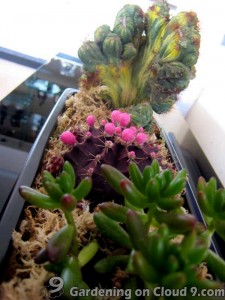 While some girls don’t find my tabletop cactus garden – In the Outer Space – absolutely lovable, all the guys, whom I have shown this tabletop cactus garden to, like the garden right at their first sight. Maybe it’s the strong contrasts of colors and shapes in the cactus garden that most guys find very cool about. I am not sure why. But anyways, I love these cacti. They are just soooo lovely 🙂 While some girls don’t find my tabletop cactus garden – In the Outer Space – absolutely lovable, all the guys, whom I have shown this tabletop cactus garden to, like the garden right at their first sight. Maybe it’s the strong contrasts of colors and shapes in the cactus garden that most guys find very cool about. I am not sure why. But anyways, I love these cacti. They are just soooo lovely 🙂
Continue reading Tabletop Garden – In the Outer Space
By Sandy, on April 14th, 2009
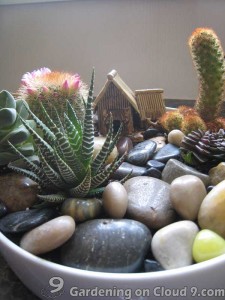
Cactus makes very good tabletop gardens. There are many species of cacti, some with outrageous colors, some with small yet flashy flowers, and some with weird shapes and sizes. We can use cactus to make a very big tabletop garden crammed with various types of cacti, or we can use some baby cacti to make a petit tabletop garden as small as a coffee cup.
Ideas of cactus garden are limitless. Just be creative and give it a try. I guarantee that you will find a lot of fun in making tabletop gardens with cactus too!
Continue reading Tabletop Garden – Cactus Garden
By Sandy, on April 12th, 2009
When we pot our plant for the first time after getting it from a garden nursery, or repot our houseplant when it has outgrown its container, we have to choose a new container with the right size for our plant.
Using Garden Containers Too Big
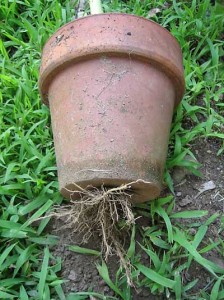 When a houseplant gets too large for its container, its roots will start circling around inside the container, and restricting themselves. If our houseplants appear to dry out more quickly than they used to, but are otherwise healthy, the plants are probably pot bound. Continue reading Containers for Houseplants – Size Matters! When a houseplant gets too large for its container, its roots will start circling around inside the container, and restricting themselves. If our houseplants appear to dry out more quickly than they used to, but are otherwise healthy, the plants are probably pot bound. Continue reading Containers for Houseplants – Size Matters!
By Sandy, on April 10th, 2009
Ok! Here is a lesson that I have learned recently – Don’t try to save ourselves some work by planting our houseplant in a container too large, for we could damage or even kill our plants!
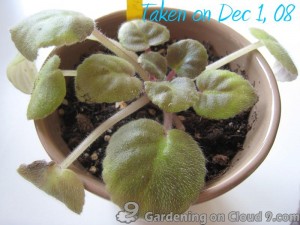 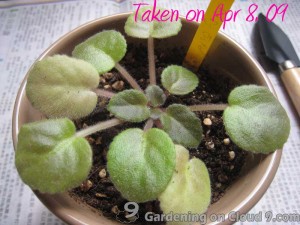
Continue reading My African Violet Doesn’t Like Its Big House
By Sandy, on April 8th, 2009
Besides sunlight, nothing can be more valuable to an indoor gardener than her garden journal. A record of your plants’ details, such as the purchasing dates of your plants, the dates when your plants bloom or mature, the sizes, the colors, and all other information you have found about your plants, is an essential resource of your gardening experience. Your gardening journal will help you answer questions about what your plant may need if it starts looking poorly, and will remind you of what works and what doesn’t.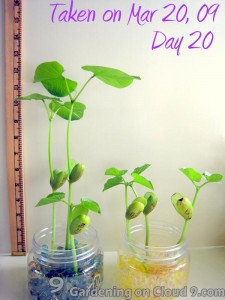
Take Photos
A picture is worth a thousand words. Instead of describing how distorted the shape of my echeveria has become, or how well (or bad) my African violet is growing, I record all these simply by taking photos of my plants every once a while. Continue reading Keeping a Garden Journal
By Sandy, on April 6th, 2009
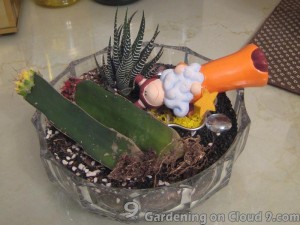 A few weeks ago, my father knocked down the two cacti in my tabletop garden – My Star when he was rushing to the windows to save the carpet and furniture from getting wet by a sudden rain. A few weeks ago, my father knocked down the two cacti in my tabletop garden – My Star when he was rushing to the windows to save the carpet and furniture from getting wet by a sudden rain.
Actually I should have anticipated this… After playing and observing this tabletop garden for a while, I have found its design deficiency – weak support. The red and yellow cacti were very tall, yet, lack of strong support. There were neither plants nor rocks to provide the cacti with enough support.
Continue reading My Star Got Crashed
By Sandy, on April 4th, 2009
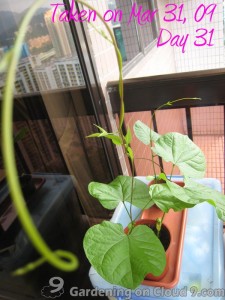 I didn’t pay much attention to my magic beans after I repotted my plants and put them in the balcony. And when I checked them out a few days later, I found that the “I Love You” bean and the “I Like You” bean had already grown so much. I didn’t pay much attention to my magic beans after I repotted my plants and put them in the balcony. And when I checked them out a few days later, I found that the “I Love You” bean and the “I Like You” bean had already grown so much.
It is not until later, after some quick research, did I learn that many climbing plants are actually fast growers. Hmm… may be my magic beans are ones of these fast growing climbers huh.
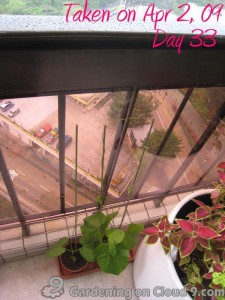 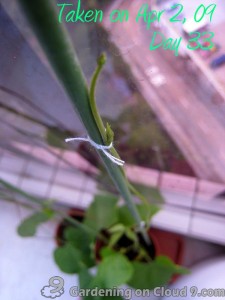
Continue reading Magic Bean Day 33 – My Magic Beans Are Climbing!
By Sandy, on April 2nd, 2009
Compare to gardeners of the United States, gardeners in Canada seem to have an easier time in importing seeds from other countries. While Canada has its import regulations of seed to control and verify that seeds imported into Canada are free of prohibited noxious weeds and meet the minimum standards for purity and germination for the crop kind in question, these seed import regulations are relatively loose when comparing with those of the United States.
For shipping seeds into Canada, the importer must fill out the Import Declaration Form (CFIA/ACIA Form 4560), Continue reading Shipping Seeds to Canada
By Sandy, on March 31st, 2009
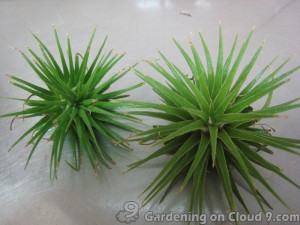 With its epiphytic characteristics, Tillandsia has earned its nickname, air plant. Instead of the roots, the plants absorb water directly through their leaves, and use their roots as wire-like anchors, hanging on trees and rocks without soil. With its epiphytic characteristics, Tillandsia has earned its nickname, air plant. Instead of the roots, the plants absorb water directly through their leaves, and use their roots as wire-like anchors, hanging on trees and rocks without soil.
Underwatering and Overwatering Your Tillandsia
Probably due to Tillandsia’s common name – Air Plant, many of us tend to think that these plants need very little or no water, as living on air. Well… of course, this is not true. Just like all other plants, Tillandsias need water. Continue reading Watering Tillandsia (a.k.a. Air Plant)
|
|
 While some girls don’t find my tabletop cactus garden – In the Outer Space – absolutely lovable, all the guys, whom I have shown this tabletop cactus garden to, like the garden right at their first sight. Maybe it’s the strong contrasts of colors and shapes in the cactus garden that most guys find very cool about. I am not sure why. But anyways, I love these cacti. They are just soooo lovely 🙂
While some girls don’t find my tabletop cactus garden – In the Outer Space – absolutely lovable, all the guys, whom I have shown this tabletop cactus garden to, like the garden right at their first sight. Maybe it’s the strong contrasts of colors and shapes in the cactus garden that most guys find very cool about. I am not sure why. But anyways, I love these cacti. They are just soooo lovely 🙂
 When a houseplant gets too large for its container, its roots will start circling around inside the container, and restricting themselves. If our houseplants appear to dry out more quickly than they used to, but are otherwise healthy, the plants are probably pot bound.
When a houseplant gets too large for its container, its roots will start circling around inside the container, and restricting themselves. If our houseplants appear to dry out more quickly than they used to, but are otherwise healthy, the plants are probably pot bound. 











Recent Comments